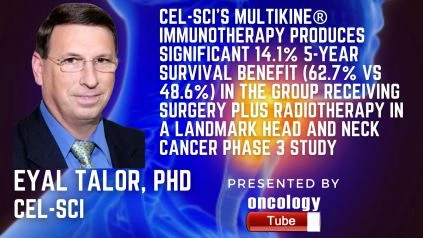Eyal Talor, Ph.D., Chief Scientific Officer, Cel-Sci speaks about CEL-SCI’S Multikine® Immunotherapy Produces significant 14.1% 5-Year Survival Benefits (62.7% VS 48.6%) In The Group Receiving Surgery Plus Radiotherapy In Landmark Head and Neck Cancer Phase 3 Study.
CEL-SCI Corporation reported today the findings of a 9.5-year pivotal Phase 3 trial of its immunotherapy Multikine® (Leukocyte Interleukin, Injection)* in the treatment of advanced (stages III and IV) primary (untreated) squamous cell carcinoma of the head and neck (SCCHN).
The study found a statistically significant (p=0.0236, HR=0.68) overall survival benefit of 14.1 percent with overall survival (OS) of 62.7 percent at 5 years for the group of patients who received the Multikine treatment regimen followed by surgery and radiotherapy therapy, but not chemotherapy, as part of their standard of care (SOC). Over time, the OS advantage grew. This category accounts for around 155,000 patients globally, or almost 40% of all advanced primary head and neck cancer cases each year. This survival benefit was not seen in patients who got the same Multikine treatment regimen prior to surgery and radiation but also received chemotherapy. The intravenous chemotherapy, cisplatin, may have nullified the survival benefit conferred by Multikine immunotherapy in these individuals.
This international study included 928 patients in stages III and IVa across 78 locations on three continents. Because five randomized individuals were never treated, the ITT group consisted of 923 patients. The Multikine therapy regimen (Multikine with CIZ: cyclophosphamide; indomethacin; zinc-multivitamins) plus SOC compared. SOC alone were the two primary comparator arms of the research. Following surgery, pathology determined whether patients should get radiation alone or concomitant radio-chemotherapy in each of these comparator arms. The protocol dictated these therapies, which are based on the NCCN (National Comprehensive Cancer Network) Guidelines for SCCHN patients. The information was evaluated in accordance with the procedure and the Statistical Analysis Plan.
The following are the results for patients who did not get chemotherapy as part of their SOC. CEL-SCI intends to seek FDA clearance for the following group:
1) At 5 years, patients who received the Multikine treatment regimen with SOC compared to SOC alone had an overall survival benefit of 14.1%, which was higher than the pre-defined 10% overall survival benefit for the trial group as a whole. This finding was statistically significant (ITT; p =0.0236, HR=0.68), with a long-term impact that lasted more than 5 years.
2) For each research therapy group, the corresponding overall survival at 3 and 5 years were as follows: Multikine with CIZ (cyclophosphamide, indomethacin, zinc-multivitamins) plus SOC was 72.4 percent at 3 years and 62.7 percent at 5 years; Multikine (no CIZ) plus SOC was 78.8% at 3 years and 55.5 percent at 5 years. At 3 years, SOC alone was 67.5 percent, and at 5 years, it was 48.6 percent. Only the first and last groups were compared in the main survival comparison.
3) The OS advantage grew with time and was visible for this group of patients from the start of the trial to the conclusion of the follow-up period, with a median follow-up length of more than 7 years for those still living.
4) In the entire treated patient group, no safety problems with Multikine were discovered during or as a result of its treatment, including no late effects.
The research failed not meeting its primary objective of a 10% increase in overall survival when the Multikine treatment regimen was provided to the whole study population (i.e., the combined lower risk (no chemotherapy) and higher risk (with chemotherapy added) groups). However, the lower risk category (no chemotherapy) had a 5-year OS benefit of 14.1%, which was higher than the study population’s overall OS benefit of 10%. In addition, CEL-SCI plans to seek FDA approval for Multikine cancer immunotherapy in this underserved patient population because the OS results for the lower risk of recurrence patients (no chemotherapy) are significant (two-sided p=0.0236, HR=0.68) and the effect is robust, durable, and increasing over time. With the previous FDA approval several decades ago, this indication indicates a critical unmet medical need. For neoadjuvant treatment in patients with squamous cell carcinoma of the head and neck — the patient group treated in this Phase 3 research – CEL-SCI has received Orphan Drug designation from the FDA.

